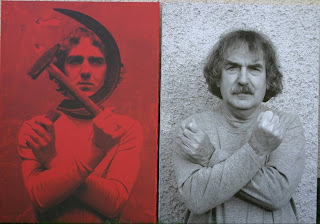
Written – directed by Alexandru Solomon
Synopsis
This is the unique story of a love and hate triangle built around something one cannot see, touch or weigh: radio waves.
I grew up with it. Every evening, in an underground atmosphere, my father listened to Radio Free Europe as anyone else did. It meant more than information. While Ceausescu’s propaganda had less and less to do with reality, Free Europe’s Romanian section provided - apart from news – some hope. We had no idea it is a CIA operation. Simultaneously, in thousands of houses and blocks across the country, millions of people performed this daily ritual. And, the next day, the words of Free Europe were on everybody’s lips.
On the other side of the Wall, in Munich or Paris, the Radio personnel listened too. They had physically escaped the country but they lived its nightmare on a daily basis. They were hunting any information coming out of the country, meeting immigrants or tourists, receiving secret messages and scanning the Romanian press for hidden hints. But soon they found themselves to be hunted in a more violent way.
Back there in Bucharest, Ceausescu and his men listened to the radio. A special unit – called the “Ether group” – was set up in the Romanian secret police in 1980. While the Romanian population was lead by fear, the Romanian leaders were themselves afraid: of Radio Free Europe. They were enraged because they couldn’t stop the radio waves reach every Romanian household and because they imagined RFE influenced Western cabinets. So they decided to silence the Radio.
The regime engaged in a war. Ceausescu employed Carlos the Jackal. An eccentric alliance was thus forged, between a national-communist dictator and international terrorists. They placed bombs at RFE’s Munich headquarters, editors were attacked in Germany and France, three of the directors died after being X-rayed.
Our film uncovers this unknown and peculiar episode of the final stage of the Cold War, from 1977 until Ceausescu’s downfall in 1989. It strangely predicts our era, that blends extremisms of all colours.
Apparently, what we thought is good prevailed: Radio Free Europe finally won the battle. A Romanian President declared in 1997 that, in winning the Cold War, “RFE has been a lot more important than the armies and the most sophisticated missiles. The 'missiles' that destroyed Communism were launched from Free Europe…” He was right: since then, mass-media replaced conventional weapons in contemporary conflicts. Meanwhile, America – as unchallenged superpower - turned towards other areas of the globe: today, RFE broadcasts in Iraq and Afghanistan. Terrorism found another God, fundamentalism replaced Marxism. Faces might have changed, but if you listen to the voices from the past, you might understand what goes on today.
Treatment: On style or about visualising radio
A film about a non-visual medium could be a bad idea. My approach is to convert this apparent visual poverty into a creative principle. Because, compared to TV, radio holds a certain mystery. As a listener, you never saw the faces of the editors, their studio or surroundings. As a speaker, one could have only imagined his listeners or the Romanian apartments, streets and farms he was talking about. Those in Ceausescu’s apparatus struggled to see with their minds’ eyes the people concealed under the voices. The magic of unveiling all these pictures and confronting our collective characters will nourish our film.
“Cold Waves” brings together three collective characters that have never met before: the listeners, RFE’s personnel, the regime and his killers. “Cold Waves” adds pictures there where one only heard voices.
Motivation
While Ceausescu was alive, we knew who was Good (the West, mainly the USA) and who the Evil was. Since then, things turned to be more complicated. We have to learn and see beyond black and white. “Cold Waves” is meant to do that. Look at our Radio Free Europe editors: you could be fighting for the right cause and still be part of a dirty game.
More about the film here.
























